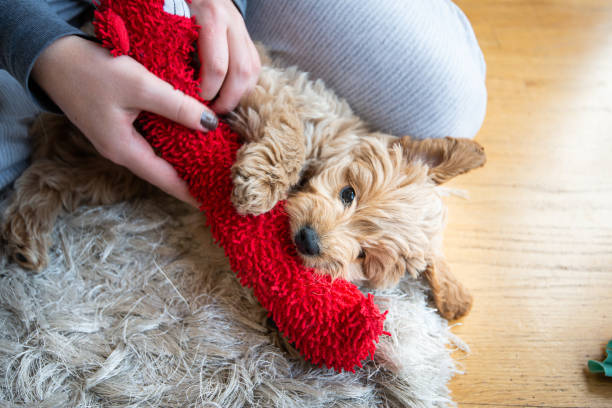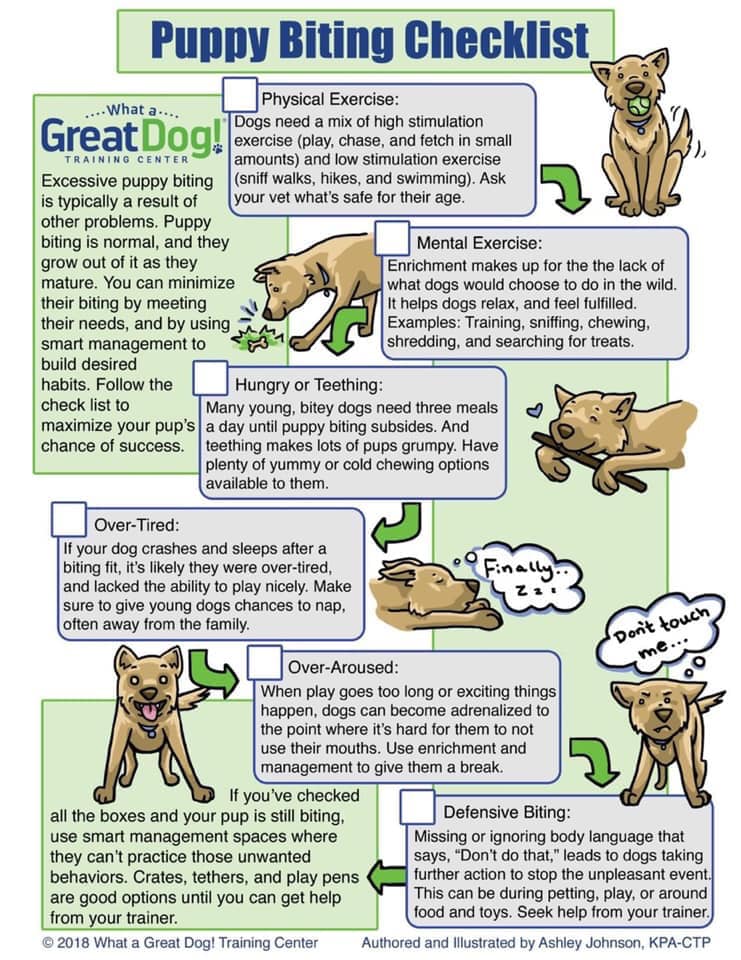- Dog Beaches
arrow_drop_down
- Dog Parks
arrow_drop_down
- Dog Camping Spots
arrow_drop_down
- Pet Sitting
arrow_drop_down
- Dog & Training Information
arrow_drop_down
- Dog Training
arrow_drop_down
- Dog Breeds
arrow_drop_down
- Dog Training
How to Stop Your Puppy from Biting
- Puppy
- Training
-
Jan 31
- Share post

The excitement of having a new puppy can often be spoilt by those sharp needle-like teeth.
We all know that the cute little fluff ball can hurt when they bite, and that some are more determined than others to make their mark.
So what can you do to stop them? Firstly, it really helps to understand why it is happening, so that you have the appropriate tool to manage the behaviour. These are the 5 main reasons.
Get a puppy to stop biting
To get a puppy to stop biting, you should start by providing appropriate chew toys to redirect their attention from your hands and feet. Consistently reward your puppy for chewing on these toys instead of inappropriate items. Additionally, discourage biting by immediately withdrawing attention and ending playtime when your puppy bites you. Consistency is key, so be patient and persistent in providing positive reinforcement and redirecting behavior. Consider enrolling in puppy training classes for additional guidance on how to manage and train your puppy.
Tired
Puppies bite when they are tired. Puppies actually need a lot more rest than you probably realise, and once they are overtired, just like two-legged kids, they can get cranky.
Manage this by making sure that your puppy has a safe spot to go to rest, where they are undisturbed by other family members – of either the two-legged or four-legged variety.
A crate is ideal for this, and I would highly recommend crate training your puppy as the benefits are enormous.
Once you notice that your puppy is starting to tire, pop them out for a toilet break and then put them in their safe spot – just like putting your toddler down for a nap.
The key here is to anticipate the behaviour and remove them before they can start.
Bored
Puppies have a really short attention span – again, just like your cranky toddler, once they get bored, they start looking for mischief.
Now that mischief can take many forms, but a lot will involve their teeth. Whether they are chomping down on your fingers or toes, or they’ve found a cushion to destuff, the reason is the same, and so is the solution.
So how do you stop your puppy from being bored? Enrichment activities are your friend here.
You might spend a couple of minutes on a simple training exercise, such as sit, drop etc.
Scatter feeding or a snuffle mat are invaluable – a tiny handful of treats scattered for pup to find. Using their sense of smell is both satisfying and tiring. You can use a small amount of their daily food allowance if you are using kibble – you can even use this method as a way of feeding one or more meals each day.
If you don’t mind the mess, shredding up some paper or cardboard is very satisfying for a pup. The key here is that, just like with all the other training, you are in charge of it and directing the behaviour. Pup is only allowed to shred the piece of cardboard GIVEN TO HIM.
Teething
Pups explore the world through their mouths, and when they are teething, everything goes in there – just like a human baby.
There are a few tricks you can use to help the teething puppy – there are plenty of textured teething toys available, but you don’t need to spend on these.
A frozen carrot is always a winner – at least in my experience – or a frozen washcloth. The cold really helps to numb the pain, and pup is being allowed to chew – which alleviates the discomfort – on something that you choose rather than whatever is closest.
There are also a few treats which you could offer which are suitable for puppies teething – small bully sticks (pizzle), pig ear strips and shark jerky are all good choices.
Hunger
Sometimes chewing can simply be due to hunger – if it’s getting close to mealtime, you might look at how much is being fed and whether you need to recalculate amounts for your growing puppy.
Overstimulation
This is probably the most common reason. Pups are very easily excited, and they start to misbehave (are you seeing a pattern here with toddlers?).
Whilst the behaviour could take many different forms, nipping is very common and many people find managing it in this scenario really tricky. Especially since it’s frequently accompanied by jumping.
So how do you stop this? Personally, I prefer to manage the behaviour by redirecting the puppy to an acceptable behaviour – and the key here is to make it something incompatible with biting and jumping. You MUST reward the puppy immediately for the acceptable alternate behaviour which they offer.
Alternatives you could ask for are to sit, to touch (eg nose to hand), to offer a paw. These are all skills you can work on during enrichment, and then use to redirect the puppy away from biting/jumping.
It’s a good idea to have a supply of treats with you at all times – either in your pocket or in a treat bag which you wear. You are then always able to reward good behaviour immediately it is offered. Timing of rewards is crucial – the puppy must understand what the reward is given for.
What about the well-meaning relatives/friends/strangers who tell you that if you are rewarding them for being naughty? Well, those people don’t understand how positive reinforcement training works, and why the timing of giving the treat is crucial to success.
You aren’t rewarding them for being naughty. You are asking them to do something acceptable, and rewarding them for that. Don’t forget, verbal praise is very important too.
Sometimes, despite your best efforts, Satan will come calling overnight and you’ll start to wonder what you’ve taken on.
Just remember, consistency is key. Don’t confuse your puppy, be consistent in the words you use, and don’t scold your puppy.
The other thing to remember is to be proactive. Watch your puppy. When you are first getting to know each other, watch carefully so that you can learn the signs that precede certain behaviours. That way you can redirect before he has a chance to practice unwanted behaviour.
Above all else, enjoy your puppy. The biting phase passes – and by practising some of the ideas here, you can make it a lot less painful for you, and a lot happier for your pup.
Infographic courtesy of What A Great Dog
Julie Black is the owner of Bonza Dog Treats, an online dog treat company that sells natural Australian dog treats. Their range includes tiny training treats and a puppy chew bundle, She is also a member of Shoalhaven Dog Training Club, and Vice-President of Beagle Rescue NSW.
Tips shared by Julie Black of Bonza Dog Treats


